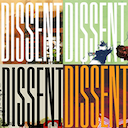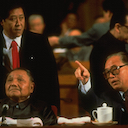
The Limits of Privatized Climate Policy
We cannot make the most urgent infrastructural investments of our lifetimes with gentle signals to financial markets. The clearest path forward is to embrace the capacity of the state.


We cannot make the most urgent infrastructural investments of our lifetimes with gentle signals to financial markets. The clearest path forward is to embrace the capacity of the state.

In Reckoning, Deva Woodly makes a case for radical Black feminist pragmatism, a philosophy “that takes lessons from many twentieth-century ideologies and forges them into a political ethic for our times.”

The antitrust reform project wants to contain domination and expand autonomy—key principles of a left political project.

The response to COVID-19 proved that the federal government is far more capable of managing the economy than many people thought. What happens now that Bidenomics faces rising headwinds?

The growing militancy of the Republican right is less about an alliance of small business against big business than it is an insurrection of one form of capitalism against another: the private, unincorporated, and family-based versus the corporate, publicly traded, and shareholder-owned.

The work of the left at this moment is to understand what new spaces have opened up and how to build upon them.
Introducing our Winter 2022 special section, “Beyond Bidenomics.”

Artificial intelligence has often been adopted in ways that reinforce exploitation and domination. But that doesn’t mean we should greet all new AI tools with refusal.

Desire is shaped by social assumptions and prejudices, Amia Srinivasan argues in The Right to Sex. So what does one do about it?

A look at our most-read articles this year.

The election of Gabriel Boric and the ongoing process to write a new constitution present a historic opportunity for the left to shape a new social pact in Chile.

An interview with Amitav Ghosh, the author of The Nutmeg’s Curse: Parables for a Planet in Crisis.

Even if community colleges were fully funded, students could still face a curriculum and styles of instruction that reinforce their unequal position in the social order.

While China is often seen as an outlier from neoliberal trends, its transformation in recent decades was not at odds with tectonic shifts in the global system of growth but an essential part of it.

In 1943, Ansel Adams traveled to the base of the Sierra Nevada to photograph Manzanar—one of the ten internment camps that together detained 120,000 Japanese Americans during the Second World War.

The 1960s effort to end discriminatory quotas sowed the seeds of the political conflicts over immigration that are still with us today.